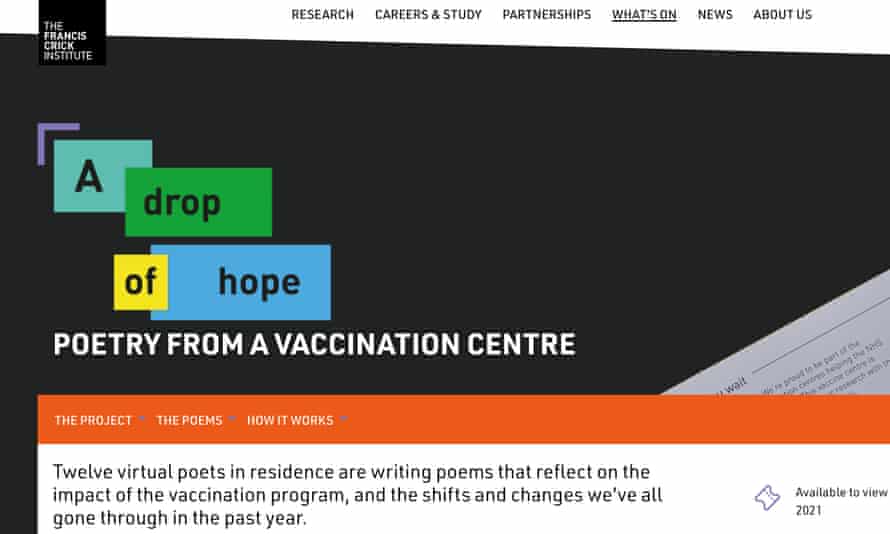Throughout the pandemic, the Francis Crick Institute in London has been closely involved: first with the research, and then with the fightback, once it had opened as a key vaccination hub. But from this weekend, the renowned biomedical research facility, the base of Nobel prize-winning geneticist Sir Paul Nurse, will also become the venue for a major poetic response to Covid-19.
Staff, volunteers and neighbours, along with those just coming to the institute for their jab, have all been invited to write words that capture their feelings about the disease and the role of science. These messages, written on postcards, have been used as the inspiration for a series of poems that will be arranged in a large rainbow display.
The new exhibition, A Drop of Hope: Poetry from a Vaccination Centre, has been created in collaboration with the production company Poet in the City, and one of the first four poems, by Nazneen Ahmed, a poet from south London, has been revealed to the Observer as the show opens.
Ahmed drew upon her experience of being pregnant during the pandemic. Entitled Dhonnobad, a Bengali term that approximately translates as “I acknowledge your goodness and speak blessings upon you”, her poem is a message of thanks. She writes:
Placing a drop of hope
Into this bitter ocean of fear and pain
It is your single drop
That will turn it sweetly salt again.
The poet explained how the lines, which build on the theme of the exhibition’s title, were inspired by reading visitors’ comments: “When I read through all the postcard contributions from volunteers and visitors to the vaccination centre, I was moved by the ways in which people were aware of how having the vaccine wasn’t just about protecting themselves but also about protecting others: others they wouldn’t ever even meet. When I started to think through what that meant, one line from one of the postcards stayed with me: ‘It means the world.’”

In January, University College London Hospitals and the Crick Institute jointly opened the vaccination centre, with a staff that includes more than 300 trained volunteers from the Crick and its partners.
Over the next two months, more poems will be added to the outside walls of the institute to form a rainbow, a symbol of solidarity with the NHS.
Of the 12 poems to go on display by the project’s virtual “poets in residence”, two will be in Bengali and two in Somali, reflecting the ethnic diversity of the contributors.
Ahmed said her words reflected the idea “that while one vaccine in a global pandemic might be thought of as a drop in the ocean, each single drop of a substance changes the entire ocean’s chemical structure too”.
This content first appear on the guardian
